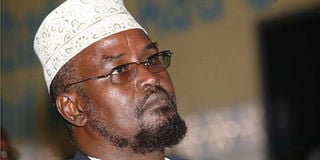Jubaland electoral dispute stirs up Kenya-Somalia tiff

Jubbaland, the region in Somalia closest to the border with Kenya, has been under President Ahmed Islam Madobe since 2013. FILE PHOTO | EVANS HABIL | NATION MEDIA GROUP
What you need to know:
- Last year, the Somali National Army was deployed near the border with Mandera ostensibly to guard national security.
- Twice last year, and this year, a spark touched off fighting between the SNA and the Jubaland security forces.
Kenya was last evening rejecting accusations that it is interfering in Somalia’s affairs, even as Nairobi protested the manner in which its ambassador to Mogadishu was ordered out of the country.
A statement from the Foreign ministry in Nairobi said Mogadishu should “avoid distracting actions”, suggesting the accusations could divert the country’s attention from the electoral calendar it faces.
Though not new, the latest beef began last Wednesday after Jubaland state President Ahmed Mohamed Madobe returned to Somalia from a trip to Kenya.
An ally of Kenya during the conquest of Kismayu port from the Al-Shabaab, Madobe, the former leader of the Ras Kamboni Brigade, routinely visits Kenya and has many political friends in Nairobi.
Parliamentary elections
This time, he held a press conference in Kismayu last week, some 500 kilometres south of Mogadishu, warning his state could pull out of elections unless a deal was reached on the venues of the parliamentary elections later this month.
On Sunday, Mohamed Ali Nur, the Somalia Foreign Affairs permanent secretary, had said on national TV that Kenya had prevailed upon the leader of Jubaland to renege on a key political agreement federal states and the federal government reached two months ago to arrange indirect elections for MPs at their capitals.
Madobe stated that according to the electoral agreement reached between President Mohamed Farmaajo and the five federal states in Somalia, Jubaland was assigned to hold elections in Kismayu and Garbaharey, the largest town in Gedo near Mandera in Kenya.
But Madobe says federal forces have since taken over the town, putting his administration on the fringes. “Does Jubaland govern Gedo region?” Madobe asked a press conference last Wednesday. “Under such circumstances, we cannot hold elections,” Madobe stressed, threatening to only collaborate with the federal government when Gedo region is handed back to his rule.
Public enemy
Was Somalia using the incident for political gain?
In 2016, Farmaajo largely campaigned on a tough stance against Ethiopia, whom Mogadishu saw as a public enemy at the time. Could he use Nairobi this time?
“It is possible for candidates to try to rally behind the flag to get political mileage,” observed Dr Kigen Morumbasi, a lecturer at Strathmore University.
“Such a policy can, however, create unintended outcomes and further alienate certain regions within Somalia. It would, therefore, be a gamble for Farmaajo.”
Last year, the Somali National Army was deployed near the border with Mandera ostensibly to guard national security.
Twice last year, and this year, a spark touched off fighting between the SNA and the Jubaland security forces.
Somalia argues it has a mandate to guard all its territories; Jubaland argues it administers the region and should guard it.
At the time the SNA were deployed, however, a former security minister in Jubaland Abdirashid Hassan Abdinur Janan, a wanted man in Mogadishu, had fled into Kenya and was staying at Mandera.
Janan was accused of fleeing jail in Mogadishu and Somalia demanded that he goes back.
Kenya, however, argued at the time that there had been no formal request for extradition, other than an accusation through the media.
The matter has since been ironed out and the two countries returned to normalcy.
Yet the controversy over the electoral programme is beyond Jubaland.
At least 14 presidential contenders and their political parties have vowed to boycott the upcoming elections, or hold parallel polls unless polling officials are changed.






